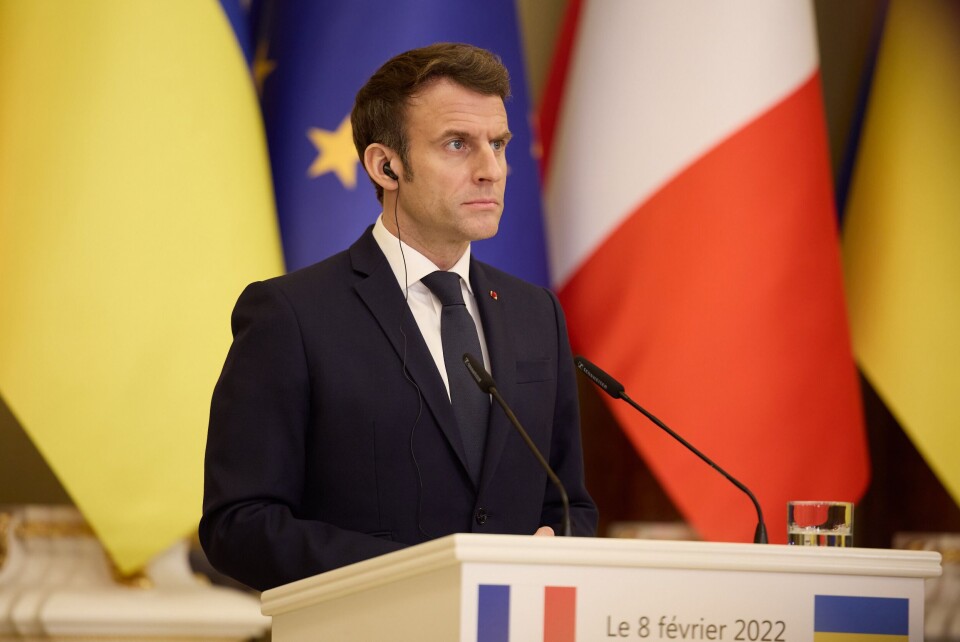-
Many parcel collection points in France are overwhelmed as Christmas approaches
Heavy customer traffic leaves some struggling to cope
-
Warnings issued over connecting to public WiFi networks in France
Lack of encryption and risk of connecting to ‘fake networks’ leave users at risk of hacking attempts
-
Provence’s santon makers seek geographical protection for historic craft
The small, hand-painted clay figurines are at the heart of traditional French Christmas nativity scenes
President Macron to make TV address to nation on Ukraine war at 20:00
It follows a security meeting that he held with members of his cabinet this morning

President Emmanuel Macron will address the nation tonight (March 2) to speak about Russia’s invasion of Ukraine.
His address will begin at 20:00 and will be televised.
The Élysée Palace, the official residence of the president, said that Mr Macron had promised to keep people in France informed about the evolution of the war and that he was upholding this promise.
Mes chers compatriotes,
— Emmanuel Macron (@EmmanuelMacron) March 2, 2022
Je m’adresserai à vous ce soir à 20h sur la guerre en Ukraine.
Mr Macron said on February 24 on the outbreak of the war that France would “not be weak” during discussions on what response to take against Russia at the G7 and the European Council.
He also said that Russia’s “act of war” will have “deep, lasting consequences on our lives and the geopolitics of our continent”.
The announcement of Mr Macron’s address came after a morning defence meeting today (March 2) with members of his cabinet.
The French government has not yet released any further details on the content of tonight’s address.
France has, alongside the EU and many other major international powers, slapped a series of heavy sanctions on Russia after the country invaded Ukraine last Thursday (February 24).
This includes a promise to bring financial sanctions on several hundred individuals linked to the government.
The EU has also targeted the Russian banking system and the airline Aeroflot and has imposed a blanket flight ban on Russian planes.
Russia’s invasion of Ukraine continues, with reports from Russia that its army has taken the southern city of Kherson. Local Ukrainian military leaders deny this, but say the city is encircled.
Ukraine's President Volodymyr Zelensky said today that nearly 6,000 Russian soldiers have been killed in the first six days of the invasion. This figure is not confirmed.
He also added that the Kremlin would not be able to take Ukraine with bombs and air strikes.
The total number of casualties on the Ukraine side is also unclear.
The United Nations human rights office said yesterday that it had confirmed 136 civilian deaths, including 13 children, with a further 400 wounded. It admitted this number could be much higher.
Ukraine’s health ministry meanwhile claimed 352 civilians have been killed, including 14 children.
‘Sanctions alone have never toppled a dictator’
The announcement of Mr Macron’s address comes as French historian Fabrice D’Almeida said, in a televised interview today, that economic sanctions were insufficient to tackle dictators.
“So far, there is no country in history that has been brought to its knees by economic sanctions,” he told Franceinfo.
He cited examples of Cuba with Fidel Castro, Iraq with Saddam Hussein and Syria with Bashar al-Assad.
He also said that France was moving too slowly on imposing sanctions on Russian individuals with ties to Mr Putin and said delivering arms to Ukraine would be more appropriate.
Read more:Ukraine war: How French companies with Russian links may be affected
He was interviewed alongside Hervé Grandjean, spokesperson for France’s Ministry of the Armed Forces.
Mr Grandjean said, “our objective with these sanctions is not to enter into war with Russia, it is to to increase the cost of the war for Vladimir Putin, to force him to cease hostilities, and return to the negotiation table with Ukraine”.
Related stories
Why people in France should not worry if they hear sirens at midday
How can I support Ukraine with donations or aid in France?
Angry, helpless: Ukraine supporters protest war in small French town
























